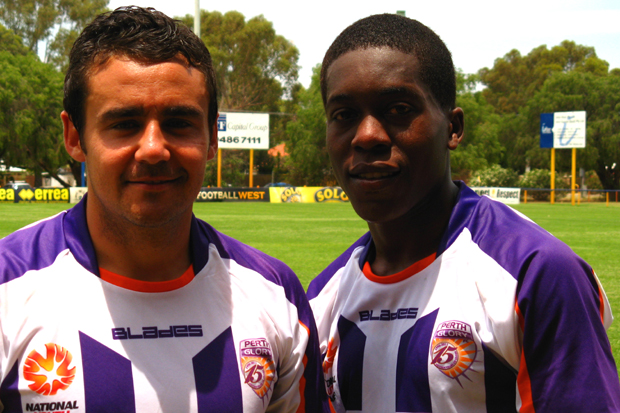It doesn’t take long chatting to Ndumba Makeche to hear just how much he misses his native Zambia.
It doesn’t take long chatting to Ndumba Makeche to hear just how much he misses his native Zambia.
The up-and-coming Perth Glory National Youth League striker has been in Western Australia for almost six years now, but memories of his youth in the Zambian capital of Lusaka remain clear.
Makeche may be following in the footsteps of players like Adelaide’s exciting Teeboy Kamara and Brisbane Roar’s Kofi Danning, but he’s still at the forefront of a new wave of African players making their mark in football competitions across the country.
According to a recent article in FourFourTwo, Football West’s National Training Centre (NTC) coach Kenny Lowe looks at a new batch of promising African players almost every week, while the growth of African football in Perth has seen the establishment of an African Nations Cup in the WA capital, with matches starting from January 15 and being played out across the next three weekends.
But even though 19-year-old Makeche is quickly making a name for himself as a promising striker for the Glory’s Youth side, helping the team to the top of the National Youth League table, the boy kicking around a home-made ball with his friends in the dusty streets of Lusaka isn’t far from the surface.
“It’s different, down there all the houses are pretty much together, all the people who live around you are pretty much your friends,” Makeche recalled.
“After school; we’d just play soccer on the street pretty much ’til my Dad pulled me in.”
“To begin, we had to make our own balls, and we pretty much play barefoot all the time, but growing a bit older we used to go buy balls … and just play small games against friends around the street.”
“It was pretty much the only thing you’d look forward to, just playing football against your friends.”
“To actually come here and get paid to play the soccer, I feel like I’m robbing someone.”
Fortunately for Makeche, unlike many other Africans who have made their way to Australia, he wasn’t fleeing a war-torn environment or a famine, although he acknowledges living in Perth will give him the opportunity of a better future than back home.
“I’ve been here for the last six years,” Makeche said.
“I was 14, just turning 15 and came here to pretty much just get a better education, ’cause my mum originally came here two years earlier to finish a degree off, so me and my brother just came here.”
“I didn’t expect to come here but ’cause my mum was here and I was living with my Dad back then and things weren’t quite going well, so she pretty much got it going and got me and my brother here to get a better future.”
“My brother and I were on my Mum’s visa, but it was just a pretty long process with everything, passports and everything, took a good eight, nine months.”
“I was happy to come to Perth but in terms of friends, family, I was sad ’cause I had left all my childhood friends and pretty much had to leave all my family down there.”
“Perth is definitely different, I had to learn a different culture down here, it took me a while, but I’m getting it.”
Makeche credits Glory National Youth League coach Gareth Naven for providing him with a whole new level of footballing knowledge, opening his eyes to the importance of structure and playing one’s role in a team.
The youngster hopes he can use this knowledge to eventually take his career further as he aims to acquire a professional contract, possibly one day with the Glory senior side.
Makeche, though, acknowledges it’s important for him to set the example and help pave the way for other Africans coming through looking to play football in Australia.
And, the more Africans playing over here, the more like home it feels, he said.
“You see a lot more (African) boys come in and the difference is that, the boys just love it, they just want to play soccer.”
“I know a few boys who have to catch a bus, train and a bus to get to training and to them, the only thing that matters is that they have a soccer ball.”
“More African players are coming in and hopefully they get more of a chance to show their talent ’cause there’s quite a few down there at the moment.”




